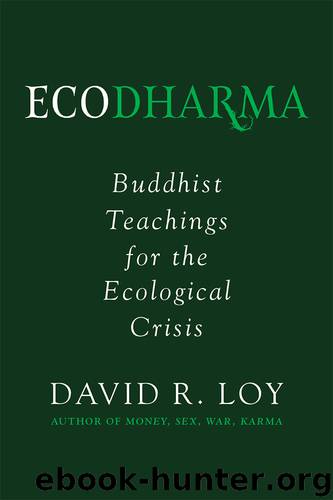Ecodharma by David Loy

Author:David Loy
Language: eng
Format: epub
Publisher: Wisdom Publications
OUR COLLECTIVE PREDICAMENT
We not only have individual senses of self, we also have group selves. I’m not only David Loy; I am male, a white person, a U.S. citizen, and so forth. And just as one’s individual sense of a separate self tends to become problematic, so collective senses of self are often problematical, because they too distinguish the inside from the outside: men from women, white from black, Americans from Chinese, and so forth. Those of us who are inside are not only different from those outside; we like to think that we are better than them, but in any case the sense of separation rationalizes pursuing our own well-being at their cost. Obviously, a lot of the world’s problems occur because of such group selves, big and small.
The issue here is whether “separate self = dukkha” also holds true for our largest collective sense of self: the duality between us as a species, Homo sapiens sapiens, and the rest of the biosphere. In fact, there are remarkable parallels between the individual sense of self and humanity’s collective sense of self:
1. Like the personal sense of self, human civilization is a construct.
2. This construct too has led to a collective sense of separation (alienation) from the natural world, which causes dukkha.
3. This dukkha involves anxiety, including uncertainty about the meaning and direction of our now-global civilization.
4. Our main response to that alienation and anxiety — the collective attempt to secure or “self-ground” ourselves — is making things worse.
5. We cannot “return to nature,” but we can realize our nonduality with the rest of the biosphere, and what that implies.
6. This collective realization will clarify what it means to be human. Being a species that is part of something greater than ourselves, our role is to serve the well-being of that whole — which will also heal us.
Let’s unpack these parallels.
Chapter 2 discussed Loyal Rue’s claim that Axial Age religions such as Christianity and Buddhism encourage indifference to social and ecological issues, because they emphasize cosmological dualism and individual salvation. In a famous essay on “The Historical Roots of Our Ecologic Crisis,” Lynn White Jr. traced our contemporary alienation from the natural world back to Christian arrogance toward nature, based on such anthropocentric texts as Genesis 1:28: “Fill the earth and subdue it, and have dominion over the fish of the sea and over the birds of the air and over every living thing.” Hugh Brody in The Other Side of Eden focuses on this “farmer’s version of history” as the pivotal moment in our dislocation from the natural world. For hunter-gatherers, in contrast to agriculturalists, “everything is founded on the conviction that home is already Eden and that exile must be avoided.” We are reminded of Lame Deer’s cooking pot, its relationship with the clouds, sky, and four-legged creatures.
Even if we think of ourselves as post-Christian, our now global civilization still takes for granted “the Christian axiom that nature has no reason for existence save to serve man. . .
Download
This site does not store any files on its server. We only index and link to content provided by other sites. Please contact the content providers to delete copyright contents if any and email us, we'll remove relevant links or contents immediately.
The Way of Zen by Alan W. Watts(6578)
Ego Is the Enemy by Ryan Holiday(5392)
The Art of Happiness by The Dalai Lama(4116)
The Book of Joy by Dalai Lama(3960)
Why Buddhism is True by Robert Wright(3434)
Spark Joy by Marie Kondo(3284)
Shift into Freedom by Loch Kelly(3181)
Happiness by Matthieu Ricard(3031)
A Monk's Guide to a Clean House and Mind by Shoukei Matsumoto(2895)
The Lost Art of Good Conversation by Sakyong Mipham(2637)
The Meaning of the Library by unknow(2552)
The Unfettered Mind: Writings from a Zen Master to a Master Swordsman by Takuan Soho(2288)
The Third Eye by T. Lobsang Rampa(2249)
Anthology by T J(2194)
Red Shambhala by Andrei Znamenski(2175)
The Diamond Cutter by Geshe Michael Roach(2054)
Thoughts Without A Thinker: Psychotherapy from a Buddhist Perspective by Epstein Mark(2000)
Twilight of Idols and Anti-Christ by Friedrich Nietzsche(1884)
Advice Not Given by Mark Epstein(1869)
